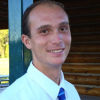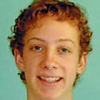News
| Emory Math Graduate students win NSF Graduate Fellowships | |
|---|---|
| Published Date: 2012-03-30 Larry Rolen, a first year PhD student, and John Lopez, an incoming PhD student, have been awarded prestigious National Science Foundation Graduate Research Fellowships. Both will be pursuing PhDs in number theory. Larry was an undergraduate at the University of Wisconsin (Madison), and John is completing his BS this spring at Brigham Young University. Larry and John join Michael Griffin as NSF Graduate Fellows in the department working in number theory. | |
| Eugene Agichtein receives Sloan Foundation Fellowship | |
|---|---|
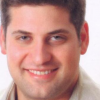 | Published Date: 2012-02-21 Eugene Agichtein, Assistant Professor of Mathematics and Computer Science, has been awarded a 2012 Sloan Foundation Fellowship. The Sloan Research Fellowships seek to stimulate fundamental research by early-career scientists and scholars of outstanding promise. These two-year fellowships are awarded yearly to 118 researchers in recognition of distinguished performance and a unique potential to make substantial contributions to their field. More details and a list of this year's fellows may be found at http://www.sloan.org/fellowships/page21 Eugene works in the area of information retrieval and text and data mining, and leads the IR lab at Emory. His website is at http://www.mathcs.emory.edu/~eugene/ Congratulations, Eugene! |
| CS Visiting Professor Search | |
|---|---|
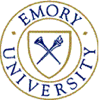 | Published Date: 2012-02-20 The Department of Mathematics and Computer Science invites applications, subject to final funding approval, for a one-year full-time visiting position in Computer Science beginning mid-August 2012. Outstanding candidates in all areas will be considered. We are particularly interested in candidates who can teach courses in database systems, artificial intelligence, or software engineering. A strong commitment to teaching excellence is required. The position may be of interest to sabbatical visitors or recent Ph.D. recipients seeking teaching experience. The teaching load is 3-4 courses for the academic year. Candidates should have completed their Ph.D. requirements in computer science or a closely related field by August 15th, 2012. Applicants should send a cover letter, CV, teaching and research statements. Concurrently, please arrange for three references (at least one evaluating teaching) to be sent directly to the committee. Materials should be sent by email to cssearch@mathcs.emory.edu. Informal inquiries are also welcome. Screening starts March 20, 2012 and will continue until the position is filled. Emory University is an Affirmative Action/Equal Opportunity Employer and welcomes applications from women and members of minority groups. |
| Number theory paper honored as an Archiv der Mathematik Distinguished Article | |
|---|---|
| Published Date: 2012-01-16 Birkhauser-Verlag, the publisher of Archiv der Mathematik recognizes unusually distinguished articles according to their scientific value and their interest to a general mathematical readership. The recent paper by Ken Ono, Asa Griggs Candler Professor, and his colleague Nick Ramsey (DePaul University) entitled "A mod L Atkin-Lehner theorem and applications" has been awarded this distinction. The paper is expected to have wide ranging consequences in the theory of modular forms and number theory. | |
| Lecture Series in Combinatorics & Graph Theory | |
|---|---|
| Published Date: 2012-01-03 The Atlanta Lecture Series in Combinatorics and Graph Theory will be held at Emory University on February 25-26, 2012. The Featured Speaker is Jacob Fox from MIT. More information can be found here. | |
| Emory's Robotics Club is in full motion. | |
|---|---|
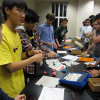 | Published Date: 2011-11-17 The Emory Robotics and Computer Engineering Club (eRACE) is an undergraduate organization at Emory University that provides students with the knowledge, skills, and resources to develop their own robots. The club's mission is simply to bring engineering to Emory through robotics and encourage learning beyond the classroom. Far from exclusive, the organization has brought together students from a breadth of disciplines including business, chemistry, math, english, and of course, computer science. Led by senior CS major Brandon Lock, the club has organized a series of tutorials designed to allow any student to participate in the club. During the Fall 2011 semester, the club has hosted events ranging from building cardboard robotic arms capable of picking up weighted bottles to creating squishy circuits from home-made, conductive play dough to programming Arduino microcontrollers, the widely used electronics prototyping platform. Throughout these events, club members build skills in mechanical principles and structures, basic electronics, and computer programming. In the upcoming spring 2012 semester, the club plans to continue their activities by building a variety of robotic and engineering projects designed, planned, and implemented by team members. Unlike other robotics clubs that are restricted by strict plans and guidelines, eRACE is free to create anything its members desire. Meetings are open to all students regardless of major or skill level. Contact Brandon Lock at block [@] emory.edu or follow the club on Facebook. |
| Emory Mathematics Fellows search now underway. | |
|---|---|
| Published Date: 2011-10-27 The Department of Mathematics and Computer Science seeks outstanding recent PhD graduates in Mathematics, for term appointments as Emory Fellows. These postdoctoral fellowships combine substantial independence with wide-ranging opportunities for professional development, and provide generous resources. Emory Fellowships are a central part of the department’s plan to enhance excellence at all levels. Fellows will have the chance to pursue research in conjunction with senior faculty members and graduate students, and will teach both undergraduate and graduate courses. Salaries are highly competitive. Fellows will also have access to research funds for travel, equipment and other expenses. Appointments are term-limited with an expected duration of two to three years, and are subject to final funding approval. For the 2012-2013 academic year, the department will consider candidates who specialize in an area of mathematics that is a focus of research within the department. More information on research emphases in the department can be found here. We invite applications from outstanding junior scholars. Candidates must have (or soon receive) a PhD in a relevant discipline, demonstrate promise of exceptional research ability, and have a commitment to excellence in teaching. Applications consisting of a cover letter, CV, research and teaching statements, and three recommendation letters directly from recommenders should be submitted via mathjobs.org. In addition, applicants must specify a potential mentor and/or research group within the department. Women and underrepresented minorities are especially encouraged to apply. Informal inquiries are also invited by email: fellows_search@mathcs.emory.edu . Screening begins January 1, 2012 and will continue until the positions are filled. Emory University is an Affirmative Action/Equal Opportunity Employer and welcomes applications from women and members of minority groups. | |
| Aaron Abrams and Skip Garibaldi have received the 2011 Lester R. Ford Award from the Mathematical Association of America | |
|---|---|
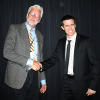 | Published Date: 2011-08-29 Lottery operators make money – lots of it apparently – so on average, players must lose money. But does this apply to rolling jackpots, where winnings can reach staggering amounts? (Rolling jackpots are those games in which prize money is rolled over from one game to the next when no one wins the jackpot.) Does there come a time when playing such a lottery makes a good bet? If so, when is that? And does that make playing a good investment? After constructing a model of a rolling jackpot lottery, the authors of this paper consider these questions. They develop an analysis of rate of return, from which they draw their conclusions regarding bets. Two outstanding features of this work are the incorporation of concrete lotteries as examples and the mathematics (mostly elementary calculus) and statistics used. They do not end their analysis at bets however, but go on to explore the less familiar (to most readers) territory of investments. This necessitates considering risk. And so, economics and subsequently linear algebra get involved. This supports their conclusion that lotteries will almost never be good investments. The subject matter, the mathematics used, the examples, and the conclusions, but especially the presentation of the material, all combine to make “Finding Good Bets” an exceptional article. Pictured: Skip Garibaldi (right) receives the award from MAA President Paul Zorn. |


